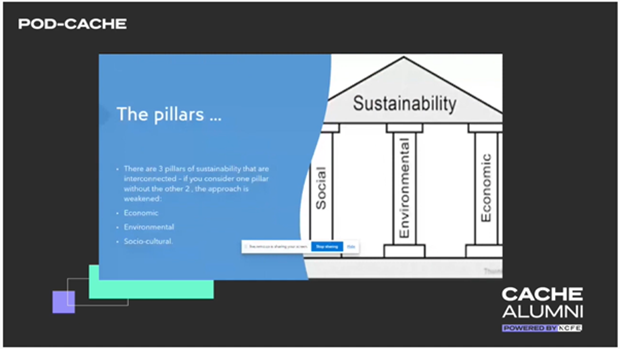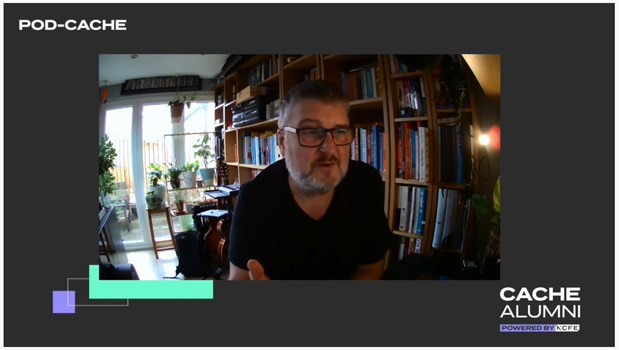We are currently experiencing severe operational disruption, and a number of our systems are offline and unavailable. We apologise for any inconvenience this may cause. Please go to our service continuity webpage where you can find a set of FAQs and an enquiry form to support you to submit urgent queries. NCFE Customer Support lines have reopened, and will be open between 10am and 4pm from Monday to Friday, on 0191 239 8000/0191 240 8862 and via email [email protected]
6 key takeaways for practitioners looking to embed sustainability and green thinking
Sustainability is currently a key focus for many organisations across the care, health and education sectors. In response to this ever-growing area of significance, CACHE Alumni – our online community for care, health and education practitioners – recently hosted a thought-provoking online event, “Sustainability for practitioners”.
We know that as practitioners, sustainability can be something that’s tricky to implement. Our interactive event therefore looked at various ways to embed sustainability, how these might work in practice, and the links between sustainability and the challenges that we face each day.
Our event was hosted by CACHE Alumni Communities Manager, Dawn Newman, and welcomed four expert guest speakers, who shared their knowledge and advice on implementing sustainability throughout your practice:
- Dr Diane Boyd (Senior Lecturer in Early Years at Liverpool John Moores University)
- Stephen Mordue (Senior Lecturer in Social Work at the University of Sunderland)
- Sarah Watkins (Author and Lecturer at Worcester University)
- David Jones (Vertical and Horizontal Markets Manager at NCFE).
Here, we summarise 6 of the key takeaways and pieces of advice from the event.
1. There are 3 interconnected pillars of sustainability
Dr Diane Boyd helped us to learn how we can better understand and achieve sustainability by explaining that there are 3 interconnected pillars of sustainability. The 3 pillars are economic, environmental, and socio-cultural – and crucially, if you consider one pillar without the others, then your whole approach to sustainability will be weakened.
Diane also outlined her belief that sustainability is aligned with the foundations and philosophy of early childhood, sharing how research has shown that “even young children are capable of sophisticated thinking in relation to socio-environmental issues, and that the earlier that education for sustainable development (ESD) ideas are introduced, the greater their impact and influence can be”†.
Using these 3 pillars of sustainability can therefore guide practitioners to ensure that you’re taking a holistic and well-rounded view when teaching and discussing climate change.
2. “Hope is really contagious – science says so”
Sarah Watkins kicked off her session by addressing the “chronic stressor” that is climate change. She explained: “It’s clear to see the impact of climate change on well-being; the way it’s explored on the news and in different types of media can cause us all to feel overwhelmed and helpless.”
So it’s all about striking a balance to ensure that climate change anxiety isn’t overwhelming – particularly when it comes to young people. Recent research by Nathan Geiger, an Assistant Professor at Indiana University, demonstrated how showing hope and speaking about climate change with a “goal-directed energy” can cause ripple effects in terms of motivation and positive feelings towards the issue among people of all ages.
“It’s very much about sharing simple positive messages, rather than alarming them. We do need to acknowledge it’s a reality – but we also need to give ideas for positive action, to try and combat feelings of powerlessness,” said Sarah. “To echo Nathan and his findings, hope is really contagious – science says so!”

Slide showing the 3 pillars of sustainability from Dr Diane Boyd's session
3. Technical skills and green jobs go hand-in-hand
In his session, David Jones explained how technical and vocational skills are already playing a huge role when it comes to the future of green jobs. For example, the Institute of Motor Industries has estimated that some 90,000 automotive technicians skilled in electric vehicles will be needed by 2030, to support not only with vehicle manufacturing, but with infrastructural needs such as charging points too.
David outlined: “This is somewhere where I suspect we’ll see more apprenticeship standards in these areas moving forwards. We know that the Institute has worked closely with the green apprenticeship advisory panel and the wider panel to review current apprenticeships against the national green jobs taskforce report, recommending to trailblazers where their products map to the needs of the green economy.”
Many of these roles will not only be career aspirations for young people who are being educated at present, but also possible routes for individuals who wish to change careers and move into green roles over the coming years.
4. Learning through sustainable activities
“Statistics show that those who regularly connect with nature are much more likely to take part in conservation activities and be more environmentally aware,” outlined Sarah – which is why both Sarah and Diane shared in their sessions a series of ideas for activities that can engage young people with sustainable practices.
One such activity is cloud watching, an activity that distracts the mind from stresses and worries and that can also help us to realise how cloudy skies can change rapidly – just as the situations we find ourselves in can. Other activities including composting, which can help us to combat a sense of powerlessness through zoning in on the eco-systems in our own backyard, as well as nature journaling, recycling, and creating makeshift “bug hotels”.
These activities encourage children to learn valuable skills, and to be hopeful about achieving change and finding solutions from a community-driven perspective.
5. The importance of essential skills
When it comes to sustainability and green jobs, essential skills are just that – essential!
Climate change is an incredibly complex issue that poses many unanswered questions, which is why green jobs in particular will have a real focus on essential skills, suggested David. These essential or everyday skills include speaking, listening, problem solving, creativity, critical thinking and positivity, as well as leadership, teamwork, resilience and adaptability.
Whilst roles such as early years educator, teaching assistant, communications manager or outreach officer may not seem as though they’re jobs focusing on sustainability, all of them demonstrate the need for these essential skills in abundance. Beyond this, there are many ways that sustainable practices can be woven into such roles, too (for example, teaching and promoting green thinking).

Stephen Mordue discusses the importance of well-being during his session
6. Remember to take care of your own well-being
If we define sustainability more broadly as “the quality of being able to continue over a period of time”, then our own mental health and well-being at work must be a priority when discussing this topic, said Stephen Mordue. As a senior lecturer in social work with a keen interest in the impact of practice on social workers' wellbeing, Stephen shared his top tips on how workplace environments can help to sustain staff and their well-being during our event.
Such tips include only using emails for direct and closed questions, and only using notifications for urgent things, so that workers can complete tasks and establish a sense of achievement.
Stephen finished his session with an emphasis on avoiding the phrase “I’m feeling stressed” and instead, asking individuals to consider “what do I mean here, and what can I break it down to?” Stress can be hard to define as it’s too big of a concept – instead, breaking down whether you’re feeling overwhelmed, tired, confused or anxious can help to provide clarity and open-up potential solutions.
These were just a few of his tips to help us build sustainability into our well-being, as well as our general thinking and everyday practice.
To read more about the qualifications in sustainability that we offer, as well as our green goals for the upcoming year, visit our recent spotlight on sustainability article. To sign up for membership of the CACHE Alumni community and get access to the full event recording, as well as other video resources, visit the CACHE Alumni website.
You can also listen to a recent Pod-CACHE episode, focusing on sustainable education and development and featuring Dr Diane Boyd, on Apple or Spotify now.
† : Quote from “Education for Sustainable Development in the Early Years” by John Siraj-Blatchford, Kimberly Caroline Smith and Ingrid Pramling Samuelsson, January 2010.
The earlier that education for sustainable development (ESD) ideas are introduced, the greater their impact and influence can be.

How we’re supporting practitioners to embed sustainability into early years
NCFE’s Sector Manager for Education and Childcare explains how our new early childhood education for sustainability resource will help practitioners to make sustainability a central part of their practice.
Read more
Knowledge and understanding of sustainability literacy for learners
Sustainability literacy is a skill that has rightly been gaining attention in the last few years. The threat of displaced communities worldwide due to the rapidly changing climate has shown that more focus needs to be given to what we are doing to our planet.
Read more
